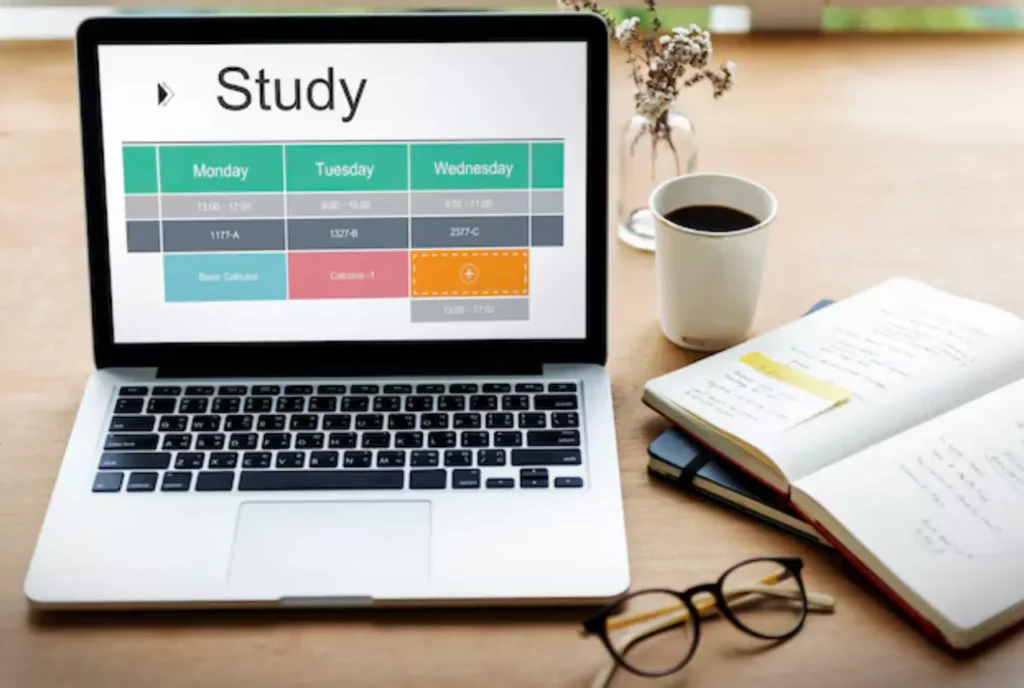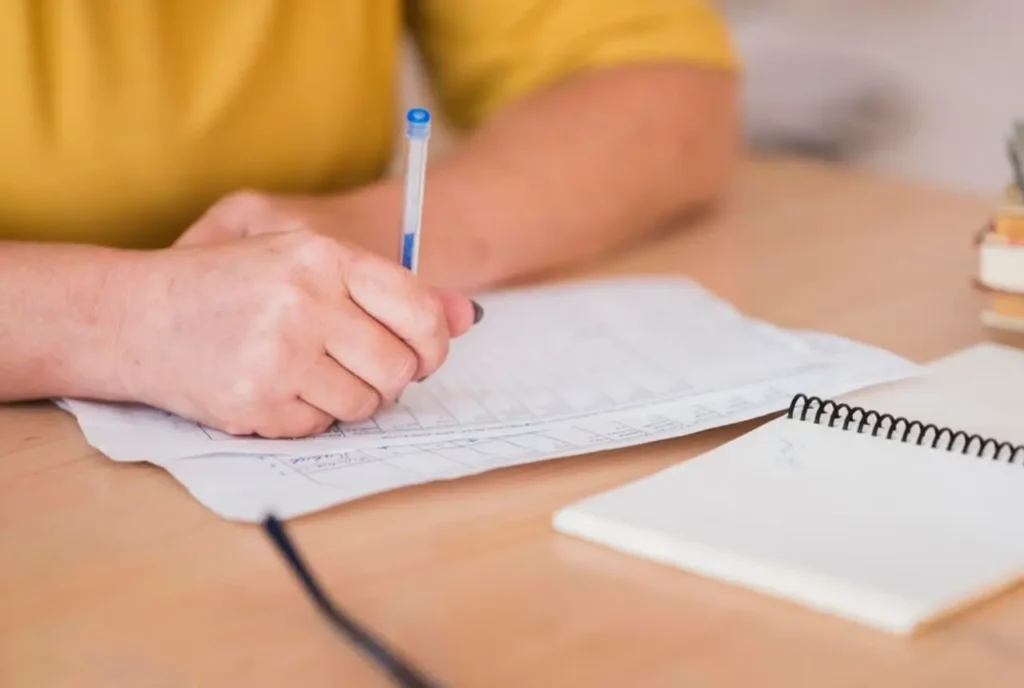Looking for study tips for board exams to improve your board exams? Board exams mark crucial milestones in students’ academic journeys, often bringing along considerable pressure to perform. Since these exams hold significant sway over future prospects, students often find themselves grappling with heightened stress levels.
This blog post aims to offer relief from this pressure by sharing 10 practical study tips and strategies for board exams. Throughout the post, we’ll focus on key ideas like crafting personalized study plans, engaging in active learning, and managing stress effectively. By integrating these approaches, students can tackle the hurdles of board exams confidently and pave the way for academic success.
Essential Study Tips for Board Exams
1. Develop a Winning Study Plan

Creating a solid study plan is like mapping out your path to academic success. It’s all about tailoring your plan to fit your needs, considering things like what’s in your syllabus, how you learn best, and when your exams are happening. When your plan matches up with these factors, you can learn more efficiently and remember things better.
There are different ways to make a study plan, like setting up weekly schedules or dividing your time into blocks for different subjects. These methods help you stay organized and make sure you cover everything without feeling overwhelmed.
But it’s not just about studying all the time. It’s also crucial to take breaks and take care of yourself. Giving yourself short breaks during study sessions helps keep your mind fresh and makes you more productive. And don’t forget about healthy habits like getting enough sleep, eating well, and exercising. Taking care of yourself like this helps your brain work better, so you can keep performing well academically.
2. Understanding vs. Memorization
In modern education, there’s a noticeable move away from just memorizing facts to really understanding the concepts behind them. Instead of just repeating what you’ve been told, the focus is on getting a solid grasp of the main ideas and how they relate to each other.
Techniques like spaced repetition help with this by having you review information at specific intervals over time. This method improves your ability to remember things in the long run, which means you understand the material better and can recall it when you need to. It’s not just about passing a test; it’s about building a strong base of knowledge that you can use throughout your life.
3. Active Learning is Key

Active learning methods go beyond passive studying by involving students in active participation, leading to deeper understanding and better retention of information. Unlike passive approaches where students simply receive information, active learning requires them to actively engage with the material by analyzing, manipulating, and applying it.
For instance, self-testing involves students quizzing themselves on what they’ve learned, reinforcing memory recall, and pinpointing areas that need more review. Practice questions push students to apply their knowledge and critical thinking skills by solving problems or analyzing scenarios. Group discussions encourage collaborative learning, allowing students to share ideas and perspectives, and broadening their understanding through diverse viewpoints.
Creating concept maps or flashcards helps students synthesize information and organize it in a coherent way, making it easier to visualize connections between concepts. By embracing active learning strategies, students not only develop crucial critical thinking skills but also actively interact with course material, leading to academic success.
4. Take Effective Notes
Taking effective notes is essential for doing well in school because it gives you a structured way to capture and understand important information. There are different techniques you can use, like the Cornell method or mind maps, which help you organize your notes in different ways. No matter which method you choose, it’s crucial to keep your notes clear and organized. Make sure to include key points and maybe even some diagrams or summaries to help you understand and remember the material better.
By using systematic note-taking methods, you not only make studying easier but also develop critical thinking skills by actively processing and summarizing complex ideas. This careful approach gives you comprehensive study materials that are crucial for preparing for exams and remembering what you’ve learned in the long run.
5. Solve Past Papers and Sample Questions

Solving through previous board exam papers and practicing with sample questions is another incredible study tip for board exams. It helps reduce exam anxiety because you know what to expect from the question format. Plus, going through past papers helps you manage your time better during the exam by getting a feel for how long each section or question might take.
Analyzing past exams can also help you identify recurring themes or patterns, which lets you focus your studying on the most important areas. Mock tests are especially useful because they simulate real exam conditions, giving you a chance to practice under pressure and refine your exam strategies. This kind of practice not only gets you ready for the exam but also improves your critical thinking skills and boosts your overall performance when it’s time to take the actual board exam.
6. Utilize Educational Resources
In today’s digital era, students have access to a wide array of online resources that are transforming the way they prepare for board exams. Educational apps, online tutorials, and specialized channels offer dynamic and interactive platforms for learning. These resources cover subjects comprehensively, catering to different learning styles and preferences.
Educational apps often include features like quizzes, flashcards, and interactive lessons, encouraging active participation and reinforcing key concepts. Online tutorials provide expert guidance and explanations, complementing classroom instruction with detailed insights and clarifications. Topic-specific channels on platforms such as YouTube offer visual demonstrations and explanations, which enhance understanding and retention.
However, amidst the abundance of resources, it’s crucial to prioritize credibility and reliability. Choosing reputable sources ensures the accuracy and validity of information, guarding against misinformation and misconceptions. By wisely utilizing educational resources, students can optimize their exam preparation, arming themselves with the knowledge and skills needed for success.
Additional Tips to Ace Your Board Exams
7. Create a Dedicated Study Space

Creating a designated study area is crucial for maintaining focus and productivity. A space free from distractions helps you concentrate better. Well-lit surroundings reduce eye strain and keep you alert, while a comfortable environment encourages longer study sessions. Having a dedicated study space sets the stage for effective learning and retention by providing an optimal atmosphere for concentration.
8. Prioritize Sleep and Healthy Habits
Getting enough quality sleep and maintaining a balanced diet is vital for keeping your brain functioning at its best. Adequate sleep helps your brain process and remember what you’ve learned, while a balanced diet provides the nutrients your brain needs to stay healthy and energized.
Drinking enough water is also important for brain function and staying focused, and regular exercise helps reduce stress and anxiety while improving focus and productivity. By making these habits a part of your routine, you create an environment that supports effective studying and sets the stage for academic success.
9. Manage Stress Effectively: Techniques for Relaxation

Too much stress can really mess with how well you do on exams because it makes it hard to concentrate, remember things, and make decisions. To deal with stress, try adding relaxation techniques to your daily routine. Meditation can help calm your mind, deep breathing exercises can ease tension, and spending time outdoors can help you relax. These practices help reduce stress, clear your mind, and make you feel better overall, so you can tackle exams with confidence and stay calm.
Conclusion
To sum up, these 10 study tips for board exams provide a well-rounded strategy to succeed in board exams. Start by creating personalized study plans, engaging in active learning, and taking effective notes. Practice with past papers, utilize online resources and set up a productive study space. Don’t forget the importance of getting enough sleep, maintaining healthy habits, and managing stress for optimal performance.
Believe in yourself and your abilities; you have what it takes to succeed. Also, don’t hesitate to reach out for support from school counselors or online groups for guidance and encouragement. With dedication and perseverance, you’re ready to conquer your exams and reach your academic goals.











